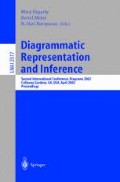Abstract
This paper addresses the design of representational systems for complex knowledge rich problems, focussing on scheduling in particular. Multiple tables are ubiquitous in representations of schedule information, but they impose large cognitive demands and inhibit the comprehension of highlevel patterns. The application and evaluation of representational design principles in the development of STARK diagrams, a novel system for scheduling problems, is reported. STARK diagrams integrate conceptual dimensions, principal relations and individual cases into a single diagrammatic structure. An experiment compared performance on STARK diagrams and a conventional representation with features typical of current commercial scheduling software interfaces. Subjects using the STARK diagram performed better at improving an examination schedule by minimising constraint violations. This provides support for the validity and utility of the design principles.
Access this chapter
Tax calculation will be finalised at checkout
Purchases are for personal use only
Preview
Unable to display preview. Download preview PDF.
References
Anderson, M., Cheng, P C-H., & Haarslev, V. (eds.): Theory and Application of Diagrams: First International Conference, Diagrams 2000. Berlin: Springer (2000)
Barwise, J., & Etchemendy, J.: Heterogenous Logic. In: Glasgow, J., Narayanan, N. H., & B. Chandrasekaran, B., (eds.): Diagrammatic Reasoning: Cognitive and Computational Perspectives. AAAI Press Menlo Park, CA (1995) 211–234
Burke, E.K., Elliman, D., Ford, P., Weare, R.: Examination Timetabling in British Universities: A Survey, Practice and Theory of Automated Timetabling I, Vol. 1153. Springer LNCS (1996) 76–90
Carter, M. W., Laporte, G.: Recent Developments in Practical Examination Timetabling, Practice and Theory of Automated Timetabling I, Vol. 1153. Springer LNCS (1996) 3–21
Casner, S. M.: A task-analytic approach to the automated design of graphic presentations. ACM Trans. on Graphics, 10(2), (1991) 111–151
Cheng, P. C-H.: Law encoding diagrams for instructional systems. Journal of Artificial Intelligence in Education, 7(1), (1996) 33–74
Cheng, P. C-H.: Interactive law encoding diagrams for learning and instruction. Learning and Instruction, 9(4), (1999) 309–326
Cheng, P. C-H.: Unlocking conceptual learning in mathematics and science with effective representational systems. Computers in Education, 33(2–3), (1999) 109–130
Chi, M. T. H.: Conceptual change within and across ontological categories: examples from learning and discovery in science. In: Giere, R. N. (ed.): Cognitive models of science. Minneapolis: University of Minnesota Press (1992) 129–186
Glasgow, J., Narayanan, N. H., & Chandrasekaran, B. (eds.): Diagrammatic Reasoning: Cognitive and Computational Perspectives. Menlo Park, CA: AAAI Press (1995)
Kotovsky, K., Hayes, J. R., & Simon, H. A.: Why are some problems hard? Cognitive Psychology, 17, (1985) 248–294
Larkin, J. H., & Simon, H. A: Why a diagram is (sometimes) worth ten thousand words. Cognitive Science, 11, (1987) 65–99
Palmer, S. E.: Fundamental aspects of cognitive representation. In: Rosch, E., & B. B. Lloyd, B. B. (eds.): Cognition and Catergorization. Hillsdale, N.J.: Lawrence Erlbaum (1978) 259–303
Scaife, M., & Rogers, Y.: External cognition: how do graphical representations work? International Journal of Human-Computer Studies, 45, (1996) 185–213
Simon, H. A.: Models of Discovery and other topics in the methods of Science. Dordrect: Reidel (1977)
Vincente, K. J.: Improving dynamic decision making in complex systems through ecological interface design: A research overview. Systems Dynamics Review, 12(4), (1996) 251–279
Zhang, J.: A representational analysis of relational information displays. International Journal of Human Computer Studies, 45, (1996) 59–74
Zhang, J.: The nature of external representations in problem solving. Cognitive Science, 21(2), (1997) 179–217
Author information
Authors and Affiliations
Editor information
Editors and Affiliations
Rights and permissions
Copyright information
© 2002 Springer-Verlag Berlin Heidelberg
About this paper
Cite this paper
Cheng, P.CH., Barone, R., Cowling, P.I., Ahmadi, S. (2002). Opening the Information Bottleneck in Complex Scheduling Problems with a Novel Representation: STARK Diagrams. In: Hegarty, M., Meyer, B., Narayanan, N.H. (eds) Diagrammatic Representation and Inference. Diagrams 2002. Lecture Notes in Computer Science(), vol 2317. Springer, Berlin, Heidelberg. https://doi.org/10.1007/3-540-46037-3_26
Download citation
DOI: https://doi.org/10.1007/3-540-46037-3_26
Published:
Publisher Name: Springer, Berlin, Heidelberg
Print ISBN: 978-3-540-43561-7
Online ISBN: 978-3-540-46037-4
eBook Packages: Springer Book Archive

